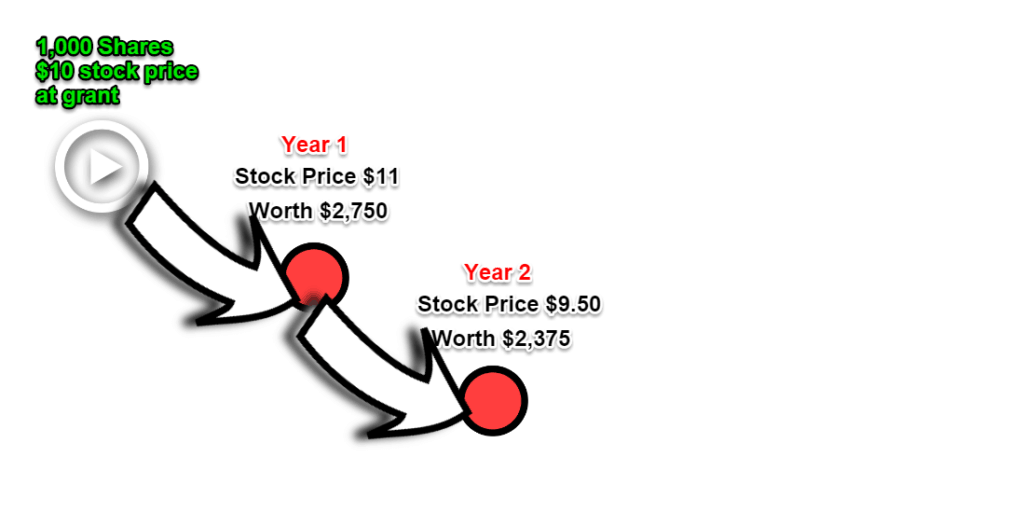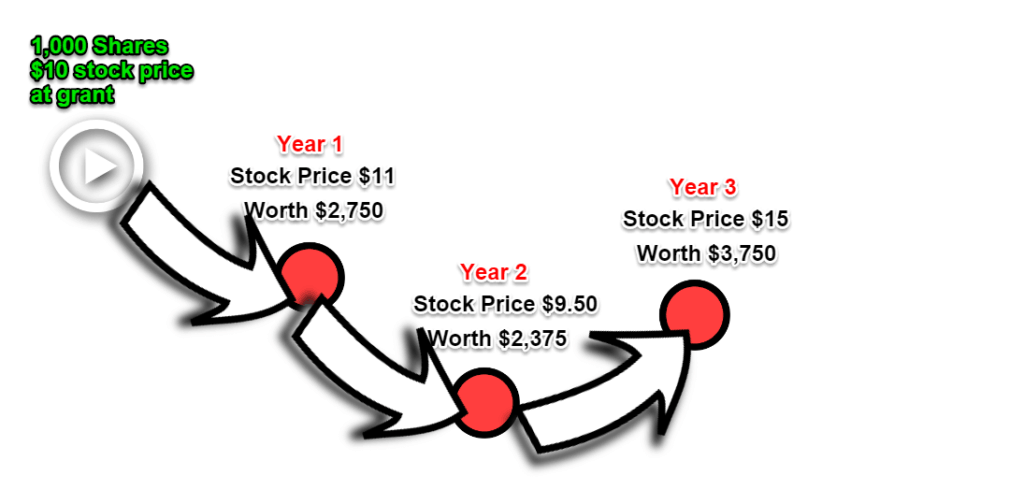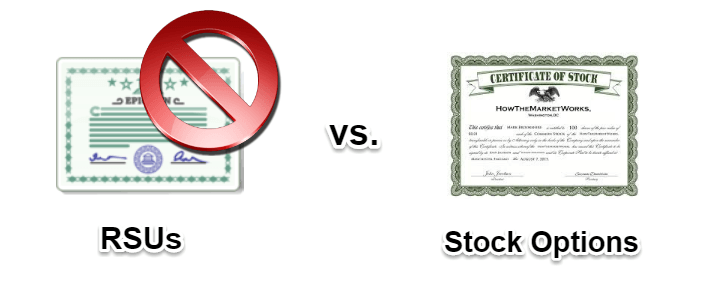Stock Options vs RSUs – The Ultimate Guide
What is the difference between Stock Options and RSUs? The ultimate guide to stock options vs RSUs covers everything you need to know to be a smart investor. In past years, many Silicon Valley technology companies have used company stock incentives such as restricted stock units and stock options.
Both stock options and RSUs can help make your trading strategy more dynamic. Many Silicon Valley startups use this equity compensation program as a cost-effective employee benefit plan so they can have loyal employees.
In the financial world, many tech investors believe that Facebook has increased the popularity of RSU stock options. In 2007, Microsoft decided to invest in Facebook $ 200 million at a valuation of $ 4 billion. A very high valuation makes it difficult for Facebook to attract new employees until they offer more attractive RSU deals.
We hear often from our trading community, and from our experience, chances are you don’t know what a restricted stock unit is. In this step-by-step RSU guide, we’ll outline what decisions you need to make to profit from buying restricted stock units.
In part one of this stock options vs. RSU guide, we’ll discuss what RSUs are and what the difference is between RSUs and stock options.
What are Restricted Stock Units?
Simply put, restricted stock units (RSUs) are grants of company stock that you own if they are set. We understand that right now, you may be scratching your head with all these new technical terms. We will take step by step to shed some light on this and related topics.
To make the explanation of RSU stock options more interactive, let’s use our imagination and follow the typical story line of the Millennial generation:

Let’s say Joe has just landed a job at a large company. The company is a publicly traded high-tech company for which Joe will be compensated with some shares that he cannot sell. These shares that Joe gets are called restricted stock units or RSUs.
Also, learn how to Swing Trade Options here.
The date Joe receives these restricted stock units is called the grant date. However, Joe cannot sell the RSUs until certain conditions have been met. This is due to the placement schedule that the tech company has set before Joe can sell his shares.
Technology companies have two options on how they can structure their vesting schedule:
- Gradual schedule – is a type of vesting where Joe can receive a small portion of the vesting over a period of 3 to 5 years. If, for example, Joe’s technology company uses a five-year schedule, then Joe will receive 20% of the stock each year.
- Cliff Schedule – is a type of vesting where Joe can receive all of the vested shares after a specified period of service. On the cliff, Joe will receive a full share after he has usually worked several years. The number of years worked is discussed when Joe negotiates his overall compensation package.
This is a win-win situation for both Joe’s employee and the employer, the tech company. On the one hand, the technology company can ensure that Joe will work for the company for a long time. This usually means higher productivity and thus greater profits.
On the other hand, Joe can be motivated to work for a technology company and have a bigger salary once it is placed and sold. Joe is required to work for a technology company during the vesting schedule to own stock.
The vesting requirement is what makes stock option RSUs restricted.
When a stock crashes, Joe can sell the stock, hold the stock if he believes the stock price has the potential to go much higher, or a combination of the two.
As the name suggests, RSUs are a form of restricted stock or restricted stock certificate. In the financial world, RSUs are also known as letter stock or restricted securities.
An example of how RSU works
Let’s assume Joe gets 1,000 shares when the stock price is at $10 a share. Joe also agreed to a 4-year grace period, which meant he would be able to sell 250 shares each year during the 4-year licensing period.
At the end of year one, the stock price is $11 a share. The 250 shares owned are now worth $2,750 (250 shares x $11).

Let’s assume that at the end of year two, the stock price drops to $9.50 per share. The 250 shares placed are now worth $2,375 (250 shares x $9.50).
* Note: The difference between stock options vs RSUs is that even if the stock price is lower than the price on the grant date, your shares are still valued based on the current market price.

At the end of year three when the third part of 250 shares vests, your stock price has appreciated to $15 a share. These shares are now worth $3,750 (250 shares x $15).

Now, in last year’s vesting period when the last 250 shares were wide the share price continued to appreciate, now trading at $ 20. These shares are now worth $ 5000 (250 shares x $ 20).
The initial 1,000 RSU shares result in $13,875 in profit or net income for you.
Let’s look through the same example points and see what is the difference between stock options vs RSUs.
Instead of receiving RSUs you get 1,000 shares of your employer’s stock. Given all the same things as the previous example, at the end of the fourth year, you will have $20,000 (1,000 shares x $20).
What is the Difference Between RSUs and Stock Options
The difference between RSUs and stock options is that RSUs limit downside, but they also limit upside. Conversely, stock options maximize price appreciation and they expire worthless if the stock price does not move above the grant price during the vesting schedule.
Restricted stock units can also be structured in such a way that you can get all the benefits of stock options. In this sense, between RSUs vs stock options, RSUs are more flexible than stock options.
The final major difference between RSUs and stock options is how they are taxed. RSUs are taxed based on ordinary income rates. However, stock options have a more complex taxation system. Learn how to avoid RSU tax traps here.
Restricted vs Preferred Stock Units

The company can decide between restricted stock units and the preferred portion of your compensation plan. Stock options are another common form of equity compensation. This is an agreement that provides the terms under which you can buy a certain number of shares at a set price. The hope is that the value of the company and therefore, the stock will increase over time.
Now, if the share price goes down you don’t lose anything because you don’t own the stock. You only have the option to buy it.
It’s like a free lunch!
You have upside and potential profits if the stock price appreciates. However, if the stock price goes down, you don’t lose anything.
You might also like this guide on the advantages of options vs futures.
We can distinguish two types of stock options:
- Incentive stock options or ISOs.
- Ineligible choice.
No need to go deeper into this topic, we just want to lay the groundwork, build a foundation to help you accumulate wealth.
Pros and Cons of Restricted Stock Units
Since there is a lot of confusion on the advantages of RSU we will outline the pros and cons of RSU. The main benefits of restricted stock units are:
- Both employees and employers will want the company to succeed.
- Employees can get additional compensation for their work.
- The more the stock price goes up, the more money you can make.
Limited stock units can also have some disadvantages:
- The restricted stock unit tax is an income tax.
- If the stock price falls, you can get less money.
- You can also lose unvested shares on termination.
Conclusion – Stock Options vs RSUs
As an investor, you have to ask yourself if not hired by a particular company, would you go to the open market and buy the stock yourself? Often times when you work for a company, you can get emotionally attached to that company and this may shape your view of how much the stock is worth.
It can happen that the company you work for, especially if it’s a start-up, has its share price increase significantly. If the company you work for becomes a giant technology company and you never sell your shares in the process in the end you can make millions of dollars in profit.
For more information on options trading, read this tutorial on How to Trade Stock Options for Beginners.
Thank you for reading!







